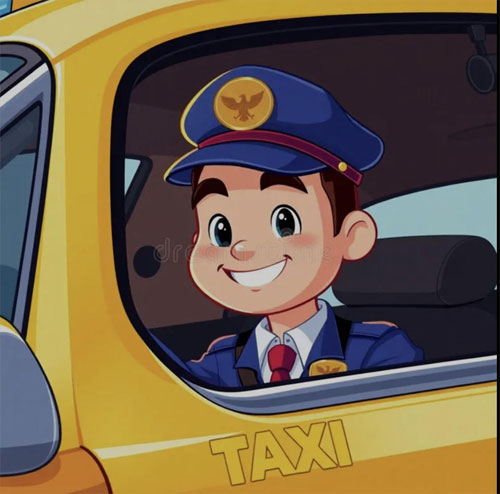October 13, 2025
The morning trip had been deceptively easy. A swift, thirty-minute glide on smooth, open roads had delivered me to my meeting in a far-flung suburb. I’d hired a taxi, my usual preference for navigating unknown territories, and the driver, a cheerful Indian man named Raj, had been a helpful guide.
The meeting concluded at 1:30 PM. I called Raj, who, being in another part of the city, sent his friend, Suresh, to pick me up. I slid into the back seat, tired and already dreaming of lunch, completely unaware of the gridlock I was about to drive into.

It was the perfect storm. School dismissal time collided with the peak of the lunch hour. The road that had been so smooth and open earlier was now a solid, unmoving line of vehicles. The sun beat down, turning the taxi into a greenhouse. I was growing hungrier and thirstier, and the air conditioning fought a losing battle against the oppressive heat.
Minutes ticked by. Twenty. Then thirty. We hadn’t moved an inch. My frustration, simmering at first, began to boil over.
“This is unbelievable,” I muttered, more to myself than to him. “A 20-minute journey, and we’re stuck here forever!”
The driver, Suresh, a mid-aged man with a calm demeanor, merely glanced in the mirror. “Yes, madam. This area is very crowded now. Too many schools.”
His calmness was almost irritating. I sighed loudly, shifted in my seat, and stared out at the stagnant sea of cars. “I’m so hungry and tired. This is just a waste of time.”
While I festered, Suresh did not. He didn’t drum his fingers on the wheel or curse under his breath. Instead, he started talking. Not about the traffic, but about the life around the traffic.
“You see that blue gate, madam?” he said, his voice even and patient. “That’s a very good school. My friend’s son studies there. He wants to be an engineer.” He pointed to a side lane. “That road leads to a small temple. Very peaceful. And that bakery there—the best puffs in this area. The children all go there after school.”
He spoke of the rhythms of the neighborhood—the parents anxiously waiting for their children, the chatter of the kids flooding the streets, the daily dance of life that was the cause of our standstill. He wasn't just sitting in traffic; he was observing a community in motion.
And I just kept wondering, What is this man made of? There was no tension in his shoulders, no impatience in his voice. He had accepted the unmovable reality with a grace that felt almost superhuman.
The 20-minute journey ultimately took an hour and half. When we finally arrived at my destination, a strange sense of clarity washed over my fatigue. I braced myself for the fare. The meter had been running for nearly double the time, and I expected a bill that would reflect my own frustration.
The amount Suresh quoted was the normal, expected charge. I was stunned.
“But… the time…” I stammered.
He simply smiled. “The traffic is not your fault, madam. It is not my fault. It is just life.”
In that moment, I didn’t just see a taxi driver; I saw a master of patience, a philosopher in plain clothes. I took his number, promising to call him directly in the future. And as I paid him, I pressed extra money into his hand—not a tip, but a tuition fee. Because what he taught me that day was worth more than any fare.
He taught me that you cannot control the traffic jam, but you can always control your journey within it. While I was a prisoner of my frustration, he was a student of the world passing by his window. The real waste of time wasn't the delay itself, but the energy I spent raging against it.
Suresh dropped me off and drove away, likely heading straight back into the chaos. But I knew, with absolute certainty, that he would be just fine. He carried his own calm with him.